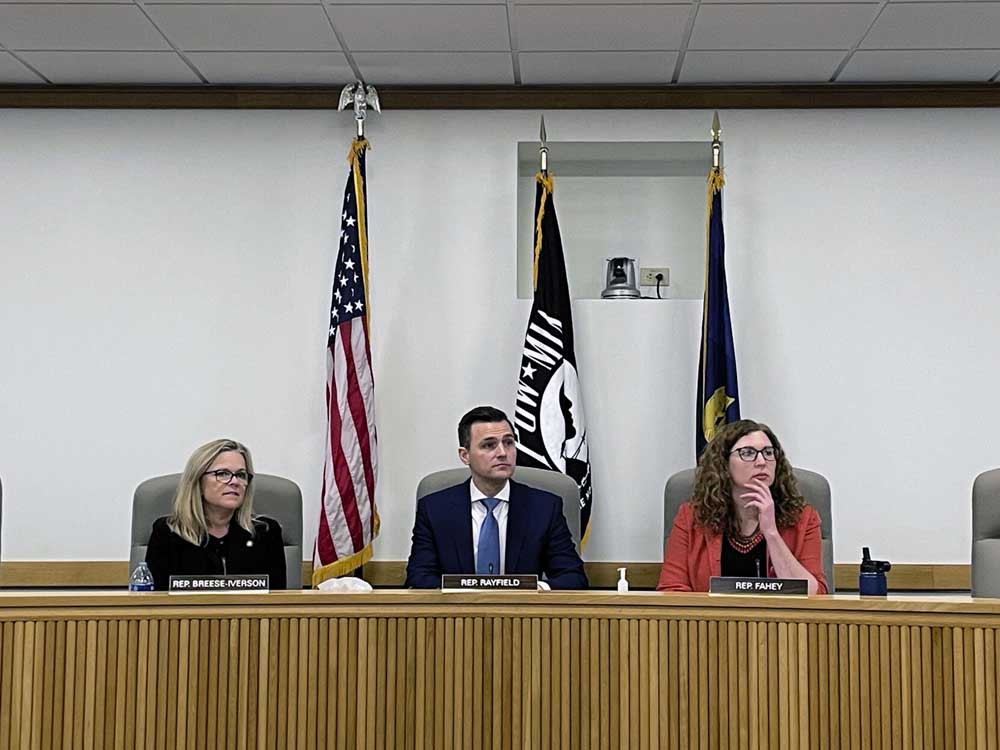Countdown clock starts ticking on Legislature’s “long session”
Published 6:00 pm Tuesday, January 17, 2023

- Oregon's House Republican Minority Leader Vikki Breese-Iverson, left, of Prineville, Democratic Speaker Dan Rayfield, center, and Democratic House Majority Leader Julie Fahey, right, hold a joint press conference on the first day of the legislative session Tuesday, Jan. 17, 2023. The three lawmakers said they want to work together to address the top issues facing the state: housing, homelessness and mental health.
SALEM — With bangs of gavels at either end of the Capitol on Tuesday, Jan. 17, the clock began ticking on the 160-day session of the Oregon Legislature.
Starting just after sunrise and continuing well after sunset, 14 committee meetings began churning through nearly 2,000 bills and resolutions introduced in the first two days of the 2023 session.
More bills are flowing through the pipeline, with the deadline to introduce legislation still more than a month away, on Feb. 21. The Oregon Constitution calls for the Legislature to wrap-up the “long session” in no more than 160 days — adjourning by June 25.
A blizzard of paper bills — yes, lawmakers get hard copies of bills they vote on — are churned out at the behest of the 60 House and 30 Senate members. Topics range from the death penalty to naming the potato as the official state vegetable.
“We will work to make things better while having challenging conversations to deliver on these and many other issues,” House Speaker Dan Rayfield, D-Corvallis, said in a meeting with reporters Tuesday.
Lawmakers must also approve a balanced state budget from the proposal Gov. Tina Kotek will submit before Feb. 1.
House Minority Leader Vikki Breese-Iverson, R-Prineville, appearing with Rayfield, said she wants to be optimistic that partisan factions can find a way forward together. She said there is a broad understanding that Oregon was at a critical point in its housing shortage.
“We agree with our colleagues across the aisle that we have to expand housing,” she said. Cutting “red tape” and reducing regulations would help the state make up the gap faster.
But Republicans want to be involved in a process where “the voice of the minority party is heard, not just pushed aside,” she said.
The November election gave Democrats the governorship, and they kept control of the Senate and House. But the majorities in the 2023 Legislature fell below the three-fifths mark that had allowed Democrats over the past four years to pass taxes and other financial legislation without any GOP help.
“House Republicans will hold the line on spending and waste, and roll back taxes,” Breese-Iverson said.
Earlier, the Democratic chairs of major Senate committees rolled out their “Oregon Works” agenda for the media.
“We have a vision,” said Senate Majority Leader Kate Lieber, D-Beaverton. “We all deserve to live in dignity.”
The agenda included safe housing, sustainable communities, being free of racism and discrimination, having equal access to good health care, child care and “world class schools,” and an economy that offers secure, good paying jobs.
“We are going to strive to make these ideals a reality for every person in every corner of our state,” Lieber said. “It’s ambitious, but the moment really demands ambition.”
Lieber said the majority of voters put Democrats into state leadership positions controlling policy choices and how public money is spent.
“We have a mandate to make this state work for you, the people of Oregon,” she said.
Kotek targeted homelessness with a state of emergency and called the lack of affordable housing the greatest danger facing the state.
“I have heard from people loud and clear,” Kotek said at her inauguration Jan. 9. “The status quo is not working. And for many Oregonians, it never worked.”
But the 2,000 pieces of legislation illustrate the staggering number of issues — big and small — facing lawmakers. The bills also show the wide gulf of opinion over the choice of possible solutions.
Committees heard from Oregon Business on the economy and labor trafficking. The long-term forecast of a hotter, drier Oregon as a result of global warming was the backdrop of a briefing from State Fire Marshal Mariana Ruiz-Temple for wildfires this summer.
Bills would tackle the competition between states for semiconductor production, expanding eligibility for domestic partnership to partners of any sex, public school enrollment declines, drought, the “child care desert,” universities and community colleges, attacks on democracy and free elections, unsafe drinking water, the future of hydroelectric power, dwindling salmon population, campaign funding limits, staffing shortages in the state’s health care workforce, a lack of money for public defenders and the debate over tolling on some Oregon highways.
One of the more cautious voices at the table of Senate Democrats came from Sen. Elizabeth Steiner, D-Portland, co-chair of the budget-writing Joint Committee of Ways & Means.
The economic roller coaster of the COVID-19 pandemic, a massive one-time infusion of federal funds in a variety of programs, and a surprisingly robust economic rebound tempered by concerns over high prices and product shortages have warped the ability to see how the future might play out.
“The budget is a little uncertain,” she said. “We don’t know what is going to happen to our economy. We just don’t know.”
Oregon maintains large economic buffers in the form of substantial emergency funds and reserves. But some of the day-to-day spending in place since 2020 doesn’t have an ongoing revenue stream to carry on into future state budgets.
“We’re going to have to figure out how to pay for that,” Steiner said.
Beyond the budget battles, there are key policy differences that could be ignited by pending bills.
Sen. Deb Patterson, D-Salem, won a tight, expensive race against former Rep. Raquel Moore-Green, R-Salem, in which abortion rights were a key issue. As chair of the Senate Health Care Committee, Patterson said Oregon residents needed better access to mental health providers and affordable primary care. On abortion, Patterson said it wasn’t enough to simply offset the impact of the U.S. Supreme Court ruling overturning rights from the 1973 Roe v. Wade decision.
“We have to not only hold the line, but be proactive in maintaining access,” she said.
Senate President Rob Wagner, D-Lake Oswego, said the Legislature owed it to voters to ensure that the Measure 114 gun control initiative was implemented. The ballot measure was narrowly approved by voters in November, but has been hung up by a Harney County judge, areas whose rulings have stalled it and some sheriffs who vow not to enforce it.
Rep. Greg Smith, R-Heppner, who has often been a moderate voice and key swing vote for Democrats in earlier sessions, said he believed there were only two issues that would lead GOP lawmakers to walk out to deny a quorum for the House or Senate to meet: abortion and guns.
The current legislative docket has 10 bills concerning abortion and 12 on firearms waiting to be considered.






